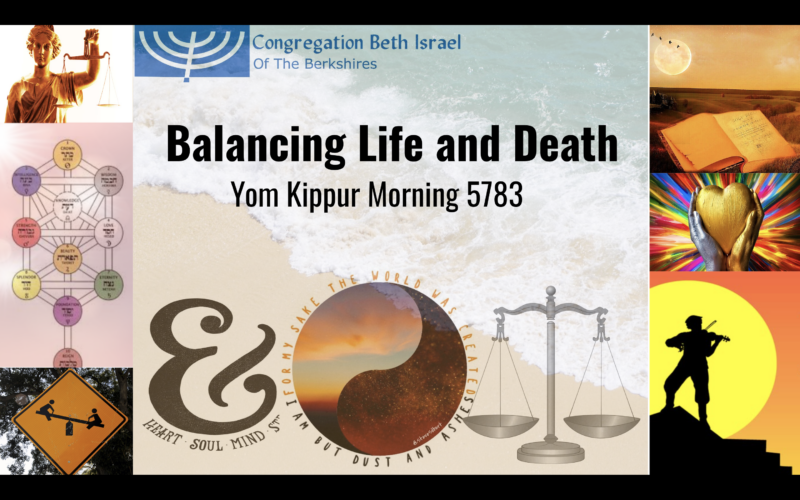Let me take you back to a few short weeks ago, when I was sick with Covid.
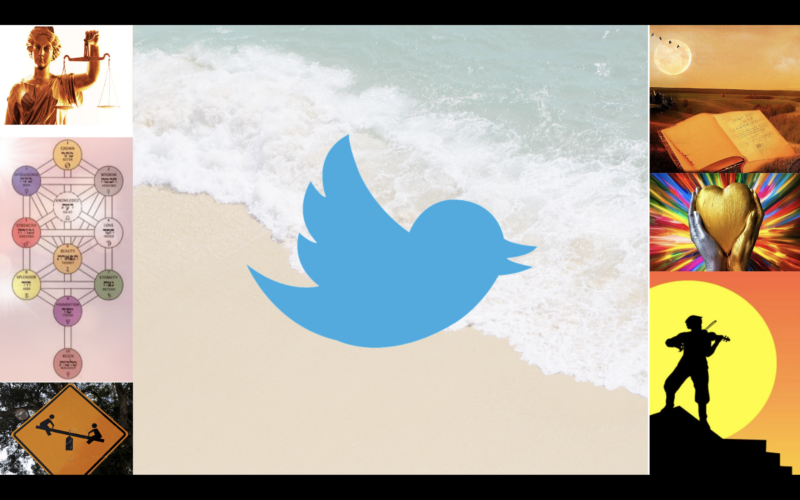
I was idly poking around Twitter. I was feeling lousy, couldn’t really focus on books or even TV. And then someone I don’t know well posted that she was in shock. A friend of hers, who’d had Covid a few months prior, had kept a lingering cough from the virus… and had just died of a pulmonary embolism. Out of the blue. She seemed fine, aside from the cough, for which doctors kept giving her cough syrup and sending her home. But we know that Covid is often associated with surprise blood clots. Boom: pulmonary embolism, and gone.
I responded with Jewish tradition’s usual words of comfort, on autopilot. What I couldn’t help thinking was: wow, Yom Kippur came early this year! I meant, the reminder to take stock of my life and confront mortality.
Yom Kippur is sometimes called a day of rehearsal for our death. We wear white, like our burial shrouds. Many fast from food and drink, like the dead who need nothing. We recite the vidui confessional prayer, as tradition teaches us to do on our deathbeds. And we do big cheshbon ha-nefesh work — taking an accounting of our souls. Who have I been? Where did I fall short? If I’m lucky enough to keep living, what do I need to change? If I died tomorrow, what words would I want to have said – what amends would I want to have made – in order to leave this life with a clean slate?
I don’t expect to die of a surprise pulmonary embolism. But none of us knows how much time we have, Covid or not.
Pirkei Avot (2:15) teaches us to “Make teshuvah the day before your death.” But who among us knows when the day of our death will be? Therefore Judaism calls us to make teshuvah everyday. To do the inner work of self-reflection, and the outer work of changing and making amends, all the time.
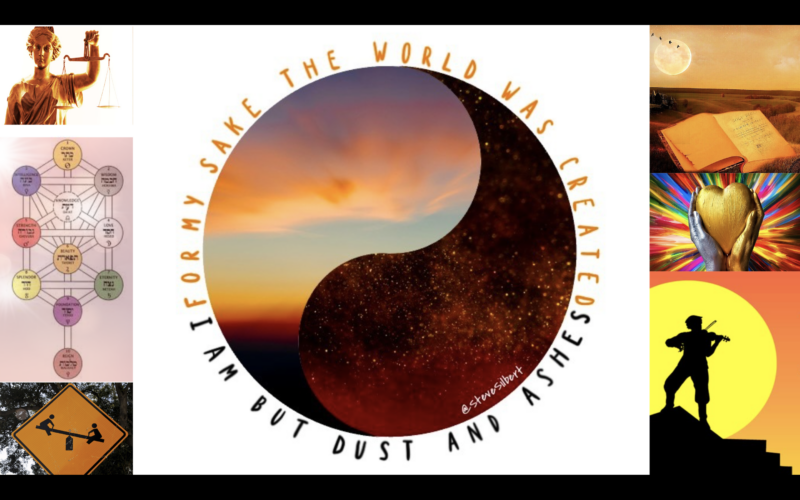
The cards we gave you on Rosh Hashanah read, “The world was made for me,” and “I am dust and ashes.” Holding both of those truths at once is the quality we call Tiferet, our holy “and” of heart-centered balance. (And the theme of this year’s Days of Awe.)
These awesome days themselves recapitulate and balance those truths
“The world was made for me” – that’s Rosh Hashanah. Hayom harat olam, “Today is the birthday of the world!” On Rosh Hashanah we celebrate the renewal of all creation.
“I am dust and ashes” – that’s today. I am dust and ashes means we are mortal. So what do we want to do with what Mary Oliver calls our “one wild and precious life”?
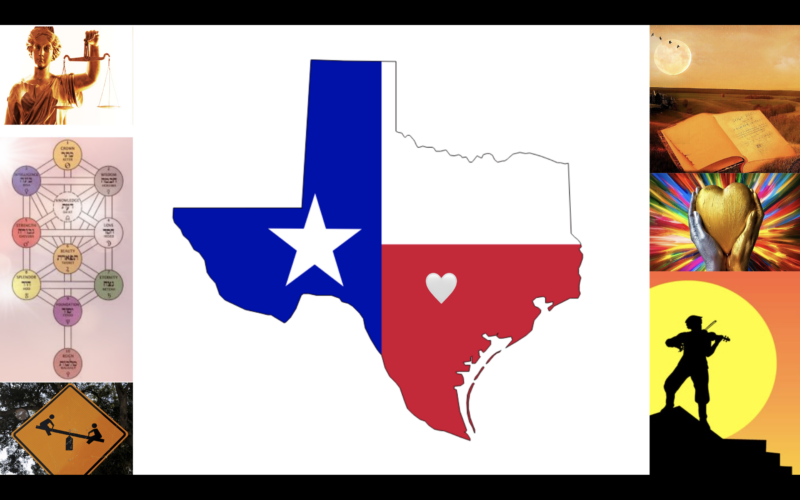
At the end of February, my son and I flew to Texas to say goodbye to my dad. He was eighty-seven and already pretty frail, and Covid hit him hard. By the time we flew down, we knew the end was near.
I remember at first being shocked at how much he’d changed. He floated around in time. Words weren’t always available, or they came out scrambled. He was often confused. He opened his mouth to be fed, like a baby bird.
And then I started to notice where my dad’s soul was shining through the fog. He couldn’t always come up with words, but he would look at my son and smile with a glint in his eye, and then tilt his head to the right until my son did the same, and then tilt his head the other way until my son mirrored him, and repeat until they were both laughing. It was like the physical comedy in old silent films. In those moments he couldn’t talk, but he could still tell his grandson a joke.
He had a favorite caregiver, a Black woman named Eddie. Sometimes he was lucid enough to tell me that she had reared ten children and had been through a lot. Other times he said she was his best friend and he’d known her for years. (He hadn’t.)
“This here’s my daughter,” he rasped to her one day, gesturing at me. “You know what she does?”
Eddie smiled at him fondly. “No, what?” she asked.
There was a momentary pause as he reached for words. Finally he blustered, “Well, ask her!”
He couldn’t remember what I do for a living. The word “rabbi” was missing from his brain. But he remembered that I do something that matters, something worth kvelling about.
“If I weren’t in jail, none of you would be here,” he said to me one morning. I asked him if he felt like he was in jail, and he shrugged.
At first I thought he meant the assisted living facility, but then I realized: he could have meant his failing body. His body that was giving out on him in so many ways had become his soul’s prison, and he was getting ready to go free.
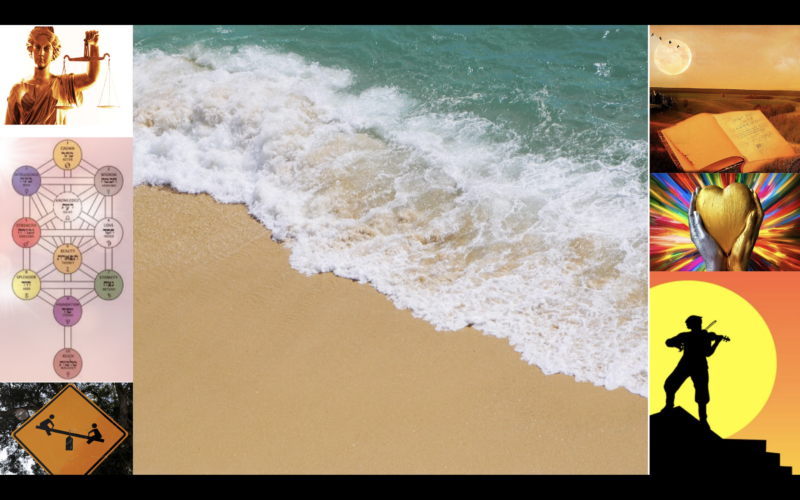
As they were dying, each of my parents showed something about who they most fundamentally were, deep down, when everything else is stripped away.
With Mom, it was her joie de vivre and her motto, “make hay while the sun shines.” With Dad, it was a deep care and sweetness, coupled with that confident glint in his eye. What do we hope will persist in us to the end? What qualities do we hope will shine through?
In the book of Exodus, Moshe asks Pharaoh to let his people go, and Pharaoh repeatedly hardens his heart and says no. At a certain point, the text shifts, and says that God hardens his heart. Which at first blush might seem sort of unfair: why would God do that? Our sages teach: when Pharaoh hardened his heart, over and over, he created that pathway in himself. He carved it deep with his own actions. All God had to do was let Pharaoh be who he already had chosen to be.
With every action, with every choice, we’re making internal pathways. And those paths inform who we are and how we are. If I walk an inner path of trying to cultivate balance, that path becomes well-worn and clear and easier to follow. If I walk an inner path of resentment, that too becomes self-perpetuating after a while.
It’s the spiritual equivalent of the old saying, “If you keep making that face, you’re going to get stuck that way.” If we keep making that face, we’re going to get stuck that way. So what face do we want to make in 5783? Okay, I’ve pushed the metaphor too far. But the truth within it stands: who we say we are is irrelevant. What matters is who our actions show us to be.
Dying tends to distill us to our essence, and we don’t get to choose what that essence is – except we actually do. We don’t get to pick something that looks nice, like choosing a sweater out of a catalogue – “You know, I’d like my inner essence this year to be pink and happy in the spring, and amber-colored and contemplative in the fall.” But we do get to make choices, and our regular daily choices will inform who we are and how we respond when push comes to shove.
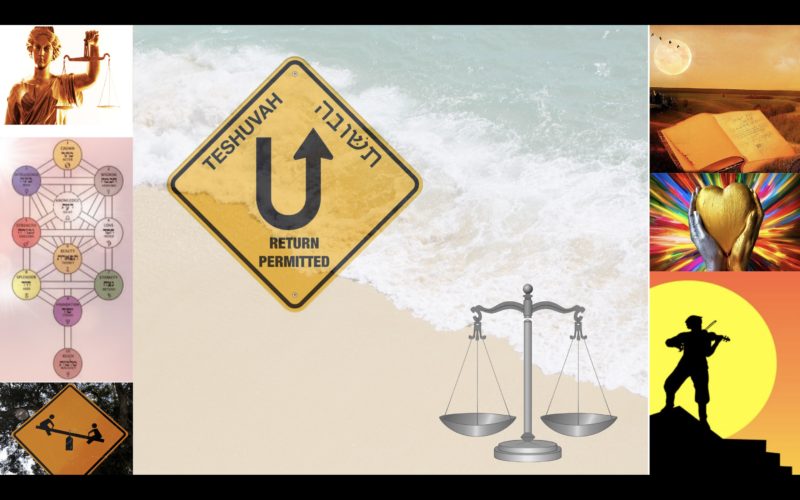
None of us can control when we die, but we do have some control over who we are in this life. The idea of teshuvah – that we can repent, can make amends, can do the work of change – means that who we’ve been doesn’t have to be who we’ll become. Balancing who we’ve been and who we’re becoming – there’s Tiferet again.
And, there’s no magic short cut. No game hack that gets us a high score we didn’t earn. Anyone can make teshuvah – and anyone who wants to make teshuvah has to do the work. And there’s no time like the present. Indeed, some say there’s no time other than the present. Now is all we have.
What changes would we need to make in order to be remembered the way we want to be remembered?
I’m not talking about the kind of new year’s resolutions some of us make on January first – “I want to be bikini-ready by summertime!” I’m talking about how we treat each other. What character qualities we bring to the fore. How we treat “the widow, the orphan, and the stranger” – the people most at-risk and vulnerable. (Maybe today it’s the trans kid, the disabled person, and the refugee.) Whether or not we’re doing something to make the world a better place. How we treat the barista or the Stop and Shop employee – or that person we don’t like who really gets on our nerves.
Because those are the face we show to the world. No matter what our self-image might be, everyone else experiences us through our actions and choices. And those actions and choices are how we’ll be remembered, when we’re gone.
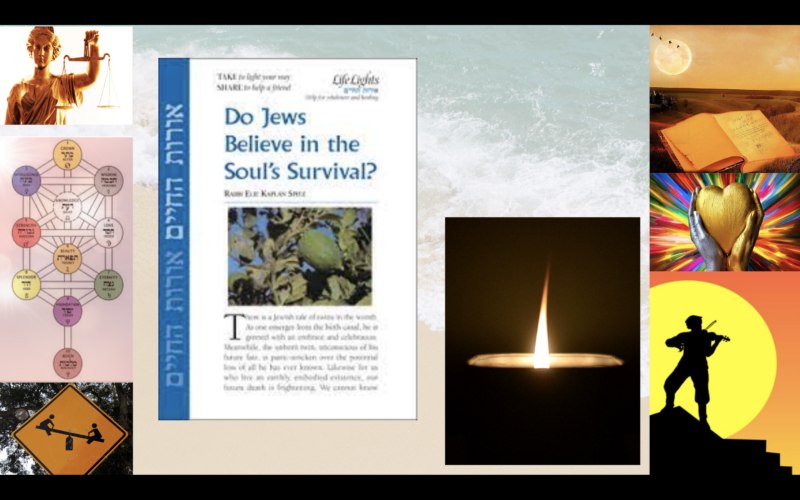
Earlier this summer a congregant came into my office, and we chatted about one thing and another. And just as she was about to leave, she held up one of the little Life Lights pamphlets from the rack in the back of the room, and she asked me, “Does Judaism believe in a soul?”
The one-word answer is yes. Yes, Judaism teaches that we have souls, and that while our bodies are temporary, our souls endure.
“No one ever told me that when I was growing up,” she said. “Honestly it would’ve sounded goyische.” As though Christians had a monopoly on spiritual discourse. Y’know what, they’re so focused on “saving our souls,” we’ll downplay souls altogether. And in some ways the early Reform movement did that, stripping out a lot of the mystical and supernatural language because it felt outdated, “Old Country,” not rational and modern – and yeah, maybe too evocative of our proselytizing neighbors.
But Jewish liturgy is full of references to the soul. The choir this morning sang a beautiful setting of אֱלֹהַי נְשָׁמָה שֶׁנָּתַֽתָּ בִּי טְהוֹרָה הִיא. – “My God, the soul that You have placed within me is pure!” Usually the soul is described as something that God gives to us, or guards for us overnight while we are sleeping and returns to us when we wake. Notably, our liturgy insists that our souls are fundamentally pure: no matter how we’ve screwed up, the light of the soul never dims. It just gets a little schmutzed-up by our mistakes, and teshuvah is how we clarify the soul so its light can shine.
Of course, this doesn’t mean that every Jew necessarily believes in an eternal soul or any kind of afterlife to which that soul might journey. “Two Jews, three opinions,” as the saying goes. If you’ve never heard this before, or if you don’t believe any of this, that’s okay, you still belong here. Even if you don’t believe in God, you still belong here! (Though remind me to send you R. Brent Spodek’s beautiful I (don’t) believe in God.)
As far as what happens to that soul once the body dies…? I can tell you that I have a book called Jewish Views of the Afterlife, and it’s several inches thick. Over the last 3000 years Judaism has offered many different visions of what might come after this life, ranging from blissful Torah study in the Garden of Eden, to reincarnation when a soul still has work to do or things to learn.
I find all of this endlessly fascinating. And in some ways it’s all beside the point. The question beneath her question was something like: is my beloved still here? I believe the answer is yes.
Many Jews believe that our dead remain accessible to us. Some say we can speak to them as we speak to God. Some say we can ask them for help, or to intercede with heaven on our behalf. Some say we may receive their answers in dreams, or in the world around us. Some say we may feel their presence in the wildlife that graces our path. (Rabbi Pam Wax has an extraordinary poem about that in her book Walking the Labyrinth.) And, of course, the silent Yizkor prayers we’ll say in a moment are a time when many of us go beneath our tallitot and connect with those who are gone.
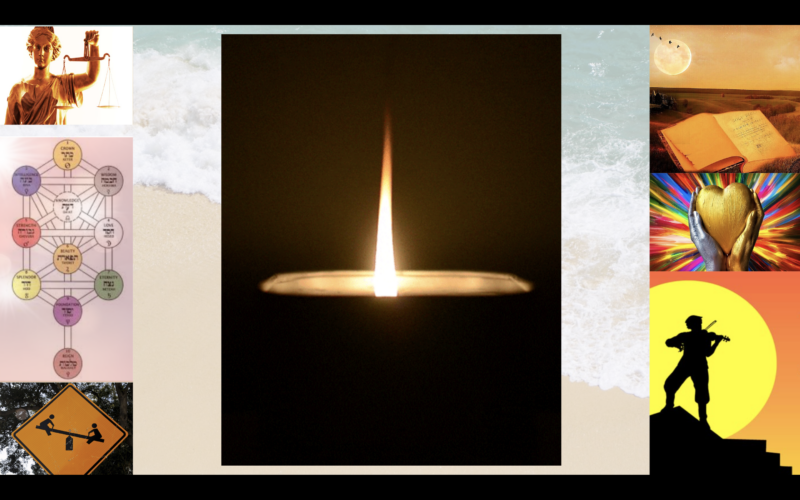
“I am dust and ashes” doesn’t mean we’re trash. It means our time is fleeting. So what will we do with it? What do we hope will shine through us to the end? If we knew we were going to die tomorrow, what amends would we rush to make, and what words would we need to say… and how about doing those things today, every day, so we’re always ready to return to the Source from whence we came?
This is the sermon that Rabbi Rachel offered on Yom Kippur morning services (cross-posted to Velveteen Rabbi.)

